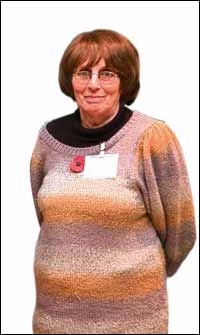|
PROFILE Human dynamo prof Kate finds time for her 50 grandchildren | |
Not only has this human dynamo held umpteen university positions of responsibility, developed important academic initiatives, been a university examiner and teacher, written countless research papers, attended numerous international conferences and broadcast on her findings but Kate also managed to raise 11 children and remembers the birthdays of all her more than 50 grandchildren and four great grandchildren. It's largely thanks to the late Lubavitcher Rebbe that the Jewish community has benefited so greatly from her highly acclaimed academic research on such topics as the Strictly Orthodox Jewish Community and Mental Health Issues, Depression in Jewish Women, Immunisation Uptake among Orthodox Jews and Welfare Needs in the Jewish Community. Kate met her husband Dr Tali Loewenthal when they were both studying psychology at University College London. She says: "My husband was born in pre-state Palestine. His father died when he was young so his family came to England." At the time of their meeting both Kate and Tali were uncertain about their future directions, both academically and religiously. Kate had opted for psychology after trying out medicine. Tali was later to leave psychology for Jewish studies, which he still teaches at UCL, specialising in chassidism and Jewish mysticism. Kate says: "When I married I agreed to an Orthodox lifestyle. About five years later we became closer to Lubavitch." So what was it about the chassidic way of life which attracted this academic? She replied: "Lubavitch provided me with an intellectual aspect towards Judaism. Until I went to a Lubavitch shiur I had not been able to make sense of the commentaries on the Chumash. The Lubavitch viewpoint gave me huge depth and purpose." I asked her to give me an example. The psychologist was particularly impressed by the Lubavitch explanation of animal sacrifice. She explained: "Chassidut says that we have different aspects to our nature. We can be like sheep wanting to follow the crowd, aggressive like bulls or extremely curious like goats. "The sacrifices symbolise the fact that we should control, tame and divert these animal instincts." Kate said that chassidut differed from the anti-chassidic Mussar movement in that the latter often led to control and denial whereas chassidut believed in using the physical world for spiritual purposes. As a psychologist, she was impressed with the chassidic psychological system. She said: "It has a very strong emphasis on the spiritual, the wish to do good and come close to godliness. The emphasis is on morality and spirituality." And it was by a seeming "accident" that Kate had the opportunity to specialise in the psychology of religion. She said: "I was walking along the university corridor in the early 1970s when my boss stopped me and said, `You are religious'." He had just met someone from Kings College who was looking for someone to teach the psychology of religion. Kate said: "It was shocking that he couldn't find anybody better qualified. But I was prepared to do the research which led to my career direction." Kate's initial reason for continuing to work after her children were born was economic, as her husband had returned to studying. So, with the help of child minders, kindergartens and schools, she struggled on, often not even taking the full seven-week maternity leave allowable in those days, because of her academic commitments. But she said: "There was a lot of pressure against women working at a time when men's wages were enough to provide for their families. "I felt a lot of communal disapproval. By the time I was expecting our fourth child I was in terrible conflict and ready to give up. "Someone gave me a cheap air fare to see the Lubavitcher Rebbe in New York with a view to getting a bracha (blessing) to be able to do so. The Rebbe looked at my note and said, 'You are a psychology lecturer. There is no conflict between psychology and Torah'. "I asked his assistant whether that meant I could give up work. He said it did not. Since then I received various brachot to continue my work. That shifted my perspective." Until 2004, Kate taught full-time at Royal Holloway, University of London, for more than 30 years after her first job at the University of Wales in Bangor. She said: "We left for Stamford Hill after two years because it was too difficult keeping kosher in Bangor, having to get meat sent from Manchester or Llandudno." Immediately after her early retirement, Kate was re-employed by the same university in a part-time capacity, retiring in 2007. But she is still busy researching for Jewish and general charities, as well as teaching and writing. And, of course, she and her husband have a full-time job keeping up with their large family, spread out all over the world, most of them as Lubavitch shlichim (emissaries). Although the Loewenthal children, who attended Lubavitch schools, yeshivot and seminaries, have not had the same academic background as their parents, the academic link still remains. Kate says: "Most of them work on campuses or with students." Daughter Chana Sorah Danow runs Leeds student Chabad House with husband Rabbi Michoel Danow and daughter Rifky is married to Rabbi Zalman Lent of Dublin's Terenure Hebrew Congregation. Other children live as far afield as Australia, the USA, Sweden and Denmark. Kate and her husband endeavour to visit them all, but can't manage every single simcha. She says: "In the last three years we have had three children and four grandchildren married, plus all the barmitzvahs and hair-cuttings - chassidim celebrate when their sons' hair is cut at the age of three. And with birthdays being of great importance to Lubavitch chassidim, all the dates of her more than 50 grandchildren and four great grandchildren are listed in Professor Kate's Palm.
|
